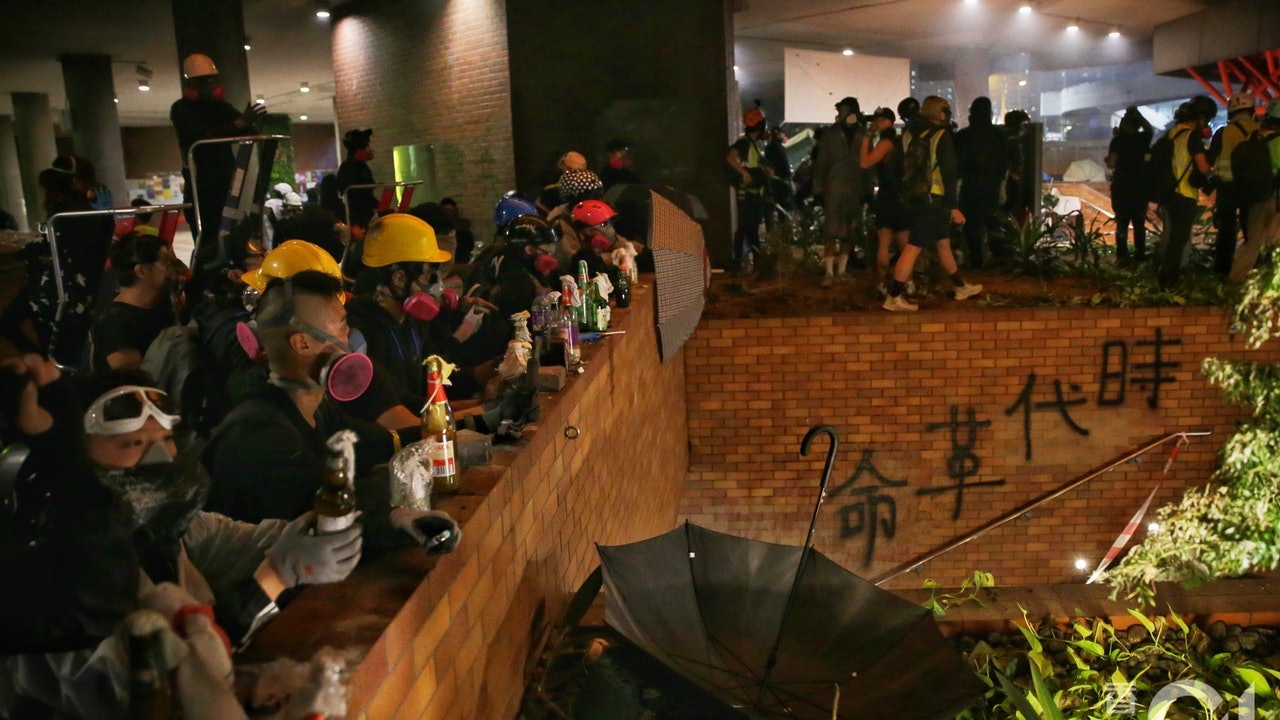At the just-concluded 2021 Taiwan Golden Horse Awards ceremony, the Best Documentary Award was awarded to Hong Kong director Zhou Guanwei's "Revolution of the Times".
In the pre-recorded short film of award-winning testimonials, Zhou Guanwei was sad and choked, expressing the hope that this work belongs to "every Hong Kong person who has a conscience, has justice, and shed tears for Hong Kong", and confessed that he had cried many times during the production of this film. Many times, I relied on this movie to comfort myself, vent anger and hatred, and face fear and trauma. Existence can give a comfort, a hug."
"Time Revolution" revolves around the protracted amendments that broke out in Hong Kong in 2019. The director recorded the occupation legislation through different perspectives such as frontline protesters, "guard children" members, college students, voluntary first aid high school students, and online media reporters. Key events such as the July 21 Yuen Long attack and the conflict at the Polytechnic University.
It is worth mentioning that Zhou Guanwei is also the director of one of the units of the 2015 Hong Kong Film Awards-winning film "Ten Years".
In view of Zhou Guanwei's own political stance, the tendency of "Revolution of the Times" can be imagined.
For Hong Kong, whether it is at the individual level or the government level, no amount of reflection and summary of the turmoil of amendments cannot be overstated.
Because, as the biggest political crisis that broke out in Hong Kong in more than half a century after the June 7 riots, the amendments not only exposed the deep-seated contradictions accumulated in Hong Kong for many years, but also forced Beijing to use thunderous means to introduce the "Hong Kong National Security Law". The electoral system was revised, and Hong Kong entered a new cycle of "one country, two systems." The previous "river does not violate the well" is no longer. The central government's overall governance power is displayed to the people of Hong Kong in a more direct and powerful posture. Patriotic education and media rectification The integration of land and ports followed one after another.
Regardless of whether Hong Kong people are willing or unwilling, this is the reality of Hong Kong after the legislative amendment turmoil.
As a local director in Hong Kong, Zhou Guanwei used the documentary "Revolution of the Time" to record this turmoil of regulations, which is not surprising.
The audience is willing to see the helplessness of the Hong Kong protesters, or feel the beautified violence more directly through this film. It does not depend on the film itself. The conclusion already exists in everyone's deep-rooted established cognition and prejudice.
So when the news came that the film won the award, although most people had not actually seen the original film, the praisers and critics were confident and repeated their understanding and narrative of the movement based on established cognition.
The storm exposed the dark side of the bustling city
For Hong Kong as a whole, reflections on this uproar of amendments that changed Hong Kong’s destiny should never stop at the "Revolution of the Times"-style tragedy, nor should Hong Kong be reduced to a "city of tragedy."
In the short term, the turmoil of the amendments is indeed a bad thing for Hong Kong. The violent speculation on the streets has torn away the veil of civilization and rule of law that Hong Kong was once proud of, presenting it extremely real and The tragic side, but in the long run, is this not a good thing?
Because facing this violent city, no one can turn a blind eye to the deep-seated structural contradictions that plague Hong Kong people.
Looking back at the experience and lessons of the 24 years since the return of Hong Kong, both Beijing and Hong Kong should realize that the problems and contradictions that plague Hong Kong today did not arise after the return. The superficial development and prosperity have been concealed, and under the dual influence of internal and external changes, it has become increasingly difficult to return.
In other words, the return of sovereignty did not mean the settlement of the Hong Kong issue from the beginning, but the beginning of a series of issues.
As the Taiwanese left-wing scholar Chen Yingzhen said, whether it is Taiwan or Hong Kong, "unification" and "return" are not just a question of sovereignty, but also a question of changing the colonial structure formed by the Cold War.
The return of sovereignty is the most critical, but the return of the "human heart" is a project that requires sustained efforts.
In June 1990, Deng Xiaoping and Bao Yugang talked about Hong Kong issues.
(VCG)
Now, through the reflection and summary of the turmoil of the amendments, coupled with Xi Jinping’s reversal of "the river does not violate the well" since he came to power in 2012, Beijing has completely changed its way of governing Hong Kong from the past "inaction" and "doing something." "In turn, he began to be more "active and promising."
But the change in Beijing alone is not enough. Whether Hong Kong can truly transform from chaos to governance, governance and prosperity depends on Hong Kong itself.
In the critical period of transformation, Hong Kong should not continue to be immersed in the tragedy of the "Revolution of the Times", but should consider the Hong Kong issue in a longer historical context, and understand both the Hong Kong before the reunification and the reunification 24 The problems and contradictions of the year, only in this way can we really find the right direction for our efforts and lead Hong Kong to set off again.
Hong Kong also needs its own "historical resolution"
On the 30th anniversary of the promulgation of the Basic Law, Luo Huining, director of the Liaison Office of the Central Committee, once wrote an article frankly that the practice of "one country, two systems" has entered the mid-term of "fifty years unchanged", and some long-term accumulated contradictions have gradually emerged, especially in the turmoil of amendments. A large number of behaviors have seriously touched the bottom line of the principle of "one country, two systems." The authority of the Constitution and the Basic Law has been challenged unprecedentedly, and many deep-seated problems have reached an important period that must be faced and resolved.
And at the mid-term moment when Deng Xiaoping promised that "one country, two systems will remain unchanged for 50 years", what is Hong Kong's thinking about its own history and practical issues?
This is a problem facing Hong Kong, and it is more urgent and necessary than simple tragedy.
The just-concluded Sixth Plenary Session of the 19th Central Committee of the Communist Party of China introduced the "third historical resolution" in the 100-year cycle of the Chinese Communist Party. For Hong Kong, it also needs its own "historical resolution." Reflect on governance, real estate hegemony, and unfinished decolonization, and explore practical issues such as implementing administrative leadership, cultivating talents for governing Hong Kong, and enhancing the comprehensive capabilities of civil servants, just like the CCP’s "third historical resolution" continued to summarize the past Just as facing the future, Hong Kong is currently facing the problem of how to sort out the past and face the future.
Just imagine: if the people of Hong Kong are still unable to sort out the past, how can they unite and look forward?





/cloudfront-eu-central-1.images.arcpublishing.com/prisa/3I74UEXLYRBBRPGPSGWNN6WXH4.jpg)

